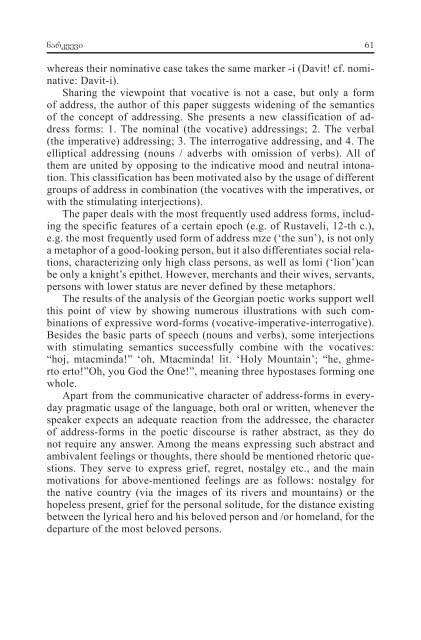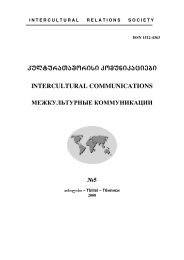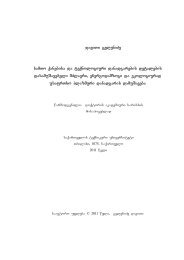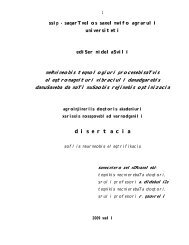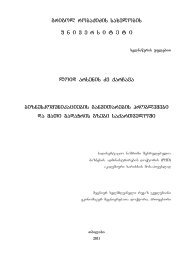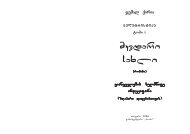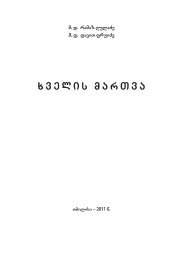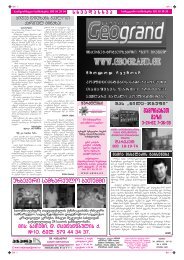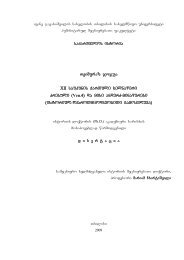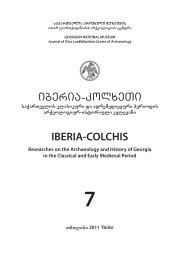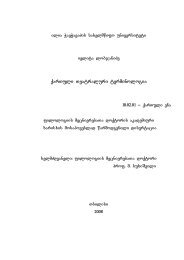- Page 1 and 2:
qarTuli wignis mxardaWeris fondi Ge
- Page 3 and 4:
filologiur kvlevaTa weliwdeuli 1 20
- Page 5 and 6:
sarCevi winaTqma merab RaRaniZe 9 n
- Page 7 and 8:
sarCevi 7 gamoxmaureba rezo marsagi
- Page 9 and 10: 10 waxnagi 1.2009 zeridan _ Seswavl
- Page 11 and 12: 12 waxnagi 1.2009 ana kalandaZe da
- Page 13 and 14: 14 waxnagi 1.2009 qarTulis SemTxvev
- Page 15 and 16: 16 waxnagi 1.2009 la harmoniuli. na
- Page 17 and 18: 18 waxnagi 1.2009 qarTveli mefeebi
- Page 19 and 20: 20 waxnagi 1.2009 intensiuri iyo, v
- Page 21 and 22: 22 waxnagi 1.2009 da qarTvelebic aR
- Page 23 and 24: 24 waxnagi 1.2009 am TvalsazrisiT m
- Page 25 and 26: 26 waxnagi 1.2009 mdenime saukuniT
- Page 27 and 28: 28 waxnagi 1.2009 1, quTaisi, 1993,
- Page 29 and 30: Suqia afridoniZe poeturi mimarTva q
- Page 31 and 32: 32 waxnagi 1.2009 mimarTvis gafarTo
- Page 33 and 34: 34 waxnagi 1.2009 1) sakuTari saxel
- Page 35 and 36: 36 waxnagi 1.2009 rogorc aRiniSna,
- Page 37 and 38: 38 waxnagi 1.2009 rac Seexeba Soris
- Page 39 and 40: 40 waxnagi 1.2009 met-naklebad xSir
- Page 41 and 42: 42 waxnagi 1.2009 mogvarebis amocan
- Page 43 and 44: 44 waxnagi 1.2009 akakis lirikisaTv
- Page 45 and 46: 46 waxnagi 1.2009 aris, rom Sorisde
- Page 47 and 48: 48 waxnagi 1.2009 _ nu miwyen, qalo
- Page 49 and 50: 50 waxnagi 1.2009 7. “Sors, Cems
- Page 51 and 52: 52 waxnagi 1.2009 tensiurad xmarobs
- Page 53 and 54: 54 waxnagi 1.2009 epi Te te bma _ m
- Page 55 and 56: 56 waxnagi 1.2009 yaSvili aRmoCnda)
- Page 57 and 58: 58 waxnagi 1.2009 va, sofelo, raSig
- Page 59: 60 waxnagi 1.2009 sailustracio wyar
- Page 63 and 64: 64 waxnagi 1.2009 qsikurma erTeulma
- Page 65 and 66: 66 waxnagi 1.2009 mandraJi, samandr
- Page 67 and 68: 68 waxnagi 1.2009 “xaniga _ galoT
- Page 69 and 70: diskursis definiciaTa analizi salom
- Page 71 and 72: 72 waxnagi 1.2009 resma, semiotikur
- Page 73 and 74: 74 waxnagi 1.2009 cireba am wyvilSi
- Page 75 and 76: 76 waxnagi 1.2009 zepiri / werilobi
- Page 77 and 78: 78 waxnagi 1.2009 nobisTvis” asev
- Page 79 and 80: 80 waxnagi 1.2009 the oppositions w
- Page 81 and 82: 82 waxnagi 1.2009 tikis doneze. xal
- Page 83 and 84: 84 waxnagi 1.2009 uwoda (m. rilkini
- Page 85 and 86: 86 waxnagi 1.2009 analizis swored a
- Page 87 and 88: 88 waxnagi 1.2009 zeobas gamoxatavs
- Page 89 and 90: 90 waxnagi 1.2009 Si, rogoricaa: re
- Page 91 and 92: 92 waxnagi 1.2009 gens literaturatu
- Page 93 and 94: 94 waxnagi 1.2009 gan arseba, romel
- Page 95 and 96: 96 waxnagi 1.2009 hans kastorpi “
- Page 97 and 98: 98 waxnagi 1.2009 vis. oRond yofier
- Page 99 and 100: 100 waxnagi 1.2009 urTierTgamijvnis
- Page 101 and 102: 102 waxnagi 1.2009 kiTxvas haideger
- Page 103 and 104: 104 waxnagi 1.2009 med maTi miznisa
- Page 105 and 106: 106 waxnagi 1.2009 is ukacrieli adg
- Page 107 and 108: 108 waxnagi 1.2009 mqissa; / Tve er
- Page 109 and 110: 110 waxnagi 1.2009 “velad gaWrasT
- Page 111 and 112:
112 waxnagi 1.2009 velobis warmosaC
- Page 113 and 114:
114 waxnagi 1.2009 aRweven Tavs tye
- Page 115 and 116:
nino sayvareliZe Aaris Tu ara grigo
- Page 117 and 118:
118 waxnagi 1.2009 grigolis komenta
- Page 119 and 120:
120 waxnagi 1.2009 rogorc zecaSi 19
- Page 121 and 122:
122 waxnagi 1.2009 lebeli, sicocxli
- Page 123 and 124:
124 waxnagi 1.2009 lis Rrma rwmeniT
- Page 125 and 126:
126 waxnagi 1.2009 marTalia, puri a
- Page 127 and 128:
maia rafava ioane mTavaraisZe, Savi
- Page 129 and 130:
130 waxnagi 1.2009 ese aw CemT¢s g
- Page 131 and 132:
132 waxnagi 1.2009 monastrebis rigs
- Page 133 and 134:
134 waxnagi 1.2009 Seiwyale mRdeli
- Page 135 and 136:
136 waxnagi 1.2009 am minawerebidan
- Page 137 and 138:
138 waxnagi 1.2009 The information
- Page 139 and 140:
140 waxnagi 1.2009 niSnebs, rom maT
- Page 141 and 142:
142 waxnagi 1.2009 sa krokodilo¡sa
- Page 143 and 144:
144 waxnagi 1.2009 Sedegad irkveva,
- Page 145 and 146:
146 waxnagi 1.2009 moSvelieba. rogo
- Page 147 and 148:
148 waxnagi 1.2009 Ti irmis moisari
- Page 149 and 150:
150 waxnagi 1.2009 nawarmoebi. maga
- Page 151 and 152:
qeTevan bezaraSvili ritorikisa da f
- Page 153 and 154:
154 waxnagi 1.2009 krebebze qadageb
- Page 155 and 156:
156 waxnagi 1.2009 meore mxriv, fil
- Page 157 and 158:
158 waxnagi 1.2009 SexedviT, TiTqos
- Page 159 and 160:
160 waxnagi 1.2009 misi winamorbedi
- Page 161 and 162:
162 waxnagi 1.2009 biT xedvebs da g
- Page 163 and 164:
164 waxnagi 1.2009 mocxadebiTi lito
- Page 165 and 166:
166 waxnagi 1.2009 adamis mier yove
- Page 167 and 168:
168 waxnagi 1.2009 ars saxelisagan
- Page 169 and 170:
170 waxnagi 1.2009 mxatvrul faqtebs
- Page 171 and 172:
172 waxnagi 1.2009 rom asmaTi amisa
- Page 173 and 174:
174 waxnagi 1.2009 axali sicocxle m
- Page 175 and 176:
176 waxnagi 1.2009 karbelaSvili 199
- Page 177 and 178:
178 waxnagi 1.2009 daviTis es Sesxm
- Page 179 and 180:
180 waxnagi 1.2009 ase ewodeba, Tum
- Page 181 and 182:
182 waxnagi 1.2009 III. “igavT xe
- Page 183 and 184:
184 waxnagi 1.2009 dabruneba Tu “
- Page 185 and 186:
186 waxnagi 1.2009 msaxvrali xeli,
- Page 187 and 188:
188 waxnagi 1.2009 cxadSi Tu sizmra
- Page 189 and 190:
190 waxnagi 1.2009 avtoris naSvileb
- Page 191 and 192:
192 waxnagi 1.2009 gvaqvs adamianis
- Page 193 and 194:
194 waxnagi 1.2009 damateba II Tu
- Page 195 and 196:
196 waxnagi 1.2009 Guramishvili’s
- Page 197 and 198:
198 waxnagi 1.2009 daeZebnos sxvada
- Page 199 and 200:
200 waxnagi 1.2009 ris istorikosis
- Page 201 and 202:
202 waxnagi 1.2009 bi da masalebi)
- Page 203 and 204:
204 waxnagi 1.2009 rogorc sCans, am
- Page 205 and 206:
206 waxnagi 1.2009 am mxriv, erTade
- Page 207 and 208:
208 waxnagi 1.2009 (26) ivliss miiC
- Page 209 and 210:
210 waxnagi 1.2009 One issue from t
- Page 211 and 212:
212 waxnagi 1.2009 viT, aris evropu
- Page 213 and 214:
214 waxnagi 1.2009 naziarebis kidev
- Page 215 and 216:
216 waxnagi 1.2009 amaRlebulisa da
- Page 217 and 218:
218 waxnagi 1.2009 ze umaRlesad, mi
- Page 219 and 220:
220 waxnagi 1.2009 gasakviri araa g
- Page 221 and 222:
222 waxnagi 1.2009 rebis gancda RvT
- Page 223 and 224:
224 waxnagi 1.2009 elada, elada! aq
- Page 225 and 226:
226 waxnagi 1.2009 sa Seiqms; xolo
- Page 227 and 228:
228 waxnagi 1.2009 momdevno leqsSi,
- Page 229 and 230:
230 waxnagi 1.2009 (uceb mohyveba W
- Page 231 and 232:
232 waxnagi 1.2009 li gaazrebis gav
- Page 233 and 234:
234 waxnagi 1.2009 cxlo sivrced”
- Page 235 and 236:
236 waxnagi 1.2009 beli is tradiciu
- Page 237 and 238:
238 waxnagi 1.2009 rom teqstad miiC
- Page 239 and 240:
240 waxnagi 1.2009 is, rac iTqva, m
- Page 241 and 242:
242 waxnagi 1.2009 is raRacas unda
- Page 243 and 244:
244 waxnagi 1.2009 ri struqtura”?
- Page 245 and 246:
246 waxnagi 1.2009 a) zmnis “aris
- Page 247 and 248:
248 waxnagi 1.2009 li ena (igulisxm
- Page 249 and 250:
250 waxnagi 1.2009 Txvac: “ra ari
- Page 251 and 252:
252 waxnagi 1.2009 TviT amgvari xed
- Page 253 and 254:
254 waxnagi 1.2009 _ mocemuli teqst
- Page 255 and 256:
256 waxnagi 1.2009 modernistulad”
- Page 257 and 258:
258 waxnagi 1.2009 lobas gavicnobie
- Page 259 and 260:
260 waxnagi 1.2009 nebTan kabelis g
- Page 261 and 262:
262 waxnagi 1.2009 Sesabamisad, mis
- Page 263 and 264:
264 waxnagi 1.2009 Rebs sistemur xa
- Page 265 and 266:
266 waxnagi 1.2009 siaTebeli Semdeg
- Page 267 and 268:
268 waxnagi 1.2009 138-140). igive
- Page 269 and 270:
270 waxnagi 1.2009 “gixarodensa
- Page 271 and 272:
272 waxnagi 1.2009 samebao dausabam
- Page 273 and 274:
274 waxnagi 1.2009 SaniZe 1984: San
- Page 275 and 276:
276 waxnagi 1.2009 alazans vkiTxe,
- Page 277 and 278:
278 waxnagi 1.2009 gadamTiels aq ra
- Page 279 and 280:
280 waxnagi 1.2009 sadac naTqvami i
- Page 281 and 282:
282 waxnagi 1.2009 mxolod meoce sau
- Page 283 and 284:
284 waxnagi 1.2009 TxzulebaTa akade
- Page 285 and 286:
286 waxnagi 1.2009 kviram ise ganvl
- Page 287 and 288:
288 waxnagi 1.2009 is akvani iyo. a
- Page 289 and 290:
290 waxnagi 1.2009 mT. uari ar ari.
- Page 291 and 292:
292 waxnagi 1.2009 rodesac is dReob
- Page 293 and 294:
294 waxnagi 1.2009 qmosteli mangiur
- Page 295 and 296:
“moqceva¡ qarTlisa¡” da “wm
- Page 297 and 298:
298 waxnagi 1.2009 13. mimomxilveli
- Page 299 and 300:
300 waxnagi 1.2009 2. Житие с
- Page 301 and 302:
302 waxnagi 1.2009 teqstebi: frangu
- Page 303 and 304:
usudan dauSvili qarTvel mweralTa sa
- Page 305 and 306:
306 waxnagi 1.2009 eqvTime TayaiSvi
- Page 307 and 308:
308 waxnagi 1.2009 saukeTeso dramat
- Page 309 and 310:
310 waxnagi 1.2009 literatura 1. fi
- Page 312 and 313:
portreti kaxaber loria ana kalandaZ
- Page 314 and 315:
portreti 315 moxataven, poeziisa, r
- Page 316 and 317:
portreti 317 vilSi ~ganxilulia~ ser
- Page 318 and 319:
portreti 319 mistikuri da dekadentu
- Page 320 and 321:
oTar CxeiZis Rvawli rusudan niSnian
- Page 322 and 323:
portreti 323 reboda mwerali. pirvel
- Page 324 and 325:
portreti 325 re ukiduresobaSi moeqc
- Page 326:
portreti 327 “bermudis samkuTxedi
- Page 329 and 330:
330 waxnagi 1.2009 ac xdeba TviT en
- Page 331 and 332:
332 waxnagi 1.2009 dinare, am reper
- Page 333 and 334:
merab RaRaniZe guruli dialeqtis mon
- Page 335 and 336:
336 waxnagi 1.2009 dabolos, gurulis
- Page 337 and 338:
338 waxnagi 1.2009 naSroms erTvis g
- Page 339 and 340:
zaza firaliSvili qarTuli literaturi
- Page 341 and 342:
342 waxnagi 1.2009 nebuli da romeli
- Page 343 and 344:
ela wifuria antiutopiuri realoba da
- Page 345 and 346:
346 waxnagi 1.2009 Tu is tendencia
- Page 347 and 348:
eqvTime koWlamazaSvili giorgi mTawm
- Page 349 and 350:
350 waxnagi 1.2009 wignis TiTqmis y
- Page 351 and 352:
352 waxnagi 1.2009 “£elTagan oqr
- Page 353 and 354:
354 waxnagi 1.2009 lic wigns boloSi
- Page 355 and 356:
gaga lomiZe interteqstualuri anu gl
- Page 357 and 358:
358 waxnagi 1.2009 amitomac SemTxve
- Page 360 and 361:
qronika “literaturaTmcodneobis Ta
- Page 362 and 363:
qrinika 363 ferenciis muSaoba warim
- Page 364:
qrinika 365 26 marti, 2008 _ merab
- Page 367 and 368:
368 waxnagi 1.2009 elbaqiZe maka _
- Page 369 and 370:
370 waxnagi 1.2009 Teologiis instit
- Page 371:
qarTuli wignis mxardaWeris fondi


